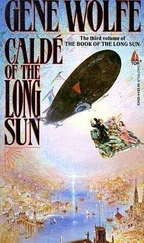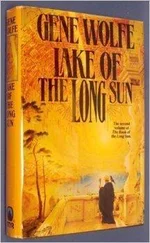Wolfe, Gene - The Best of Gene Wolfe
Здесь есть возможность читать онлайн «Wolfe, Gene - The Best of Gene Wolfe» весь текст электронной книги совершенно бесплатно (целиком полную версию без сокращений). В некоторых случаях можно слушать аудио, скачать через торрент в формате fb2 и присутствует краткое содержание. Жанр: Старинная литература, на английском языке. Описание произведения, (предисловие) а так же отзывы посетителей доступны на портале библиотеки ЛибКат.
- Название:The Best of Gene Wolfe
- Автор:
- Жанр:
- Год:неизвестен
- ISBN:нет данных
- Рейтинг книги:5 / 5. Голосов: 1
-
Избранное:Добавить в избранное
- Отзывы:
-
Ваша оценка:
- 100
- 1
- 2
- 3
- 4
- 5
The Best of Gene Wolfe: краткое содержание, описание и аннотация
Предлагаем к чтению аннотацию, описание, краткое содержание или предисловие (зависит от того, что написал сам автор книги «The Best of Gene Wolfe»). Если вы не нашли необходимую информацию о книге — напишите в комментариях, мы постараемся отыскать её.
The Best of Gene Wolfe — читать онлайн бесплатно полную книгу (весь текст) целиком
Ниже представлен текст книги, разбитый по страницам. Система сохранения места последней прочитанной страницы, позволяет с удобством читать онлайн бесплатно книгу «The Best of Gene Wolfe», без необходимости каждый раз заново искать на чём Вы остановились. Поставьте закладку, и сможете в любой момент перейти на страницу, на которой закончили чтение.
Интервал:
Закладка:
Neither, in all probability, would the imaginary burglar seek to hold us for ransom, though my father was thought in some quarters to be immensely rich. There were several reasons for this. Those few people who knew that my brother and I existed knew also, or at least had been led to believe, that my father cared nothing at all for us. Whether this was true or not I cannot say; certainly I believed it, and my father never gave me the least reason to doubt it, though at the time the thought of killing him had never occurred to me.
And if these reasons were not sufficiently convincing, anyone with an understanding of the stratum in which he had become perhaps the most permanent feature would realize that for him, who was already forced to give large bribes to the secret police, to once disgorge money in that way would leave him open to a thousand ruinous attacks; and this may have been—this and the fear in which he was held—the real reason we were never stolen.
The iron shutter is (for I am writing now in my old dormitory room) hammered to resemble in a stiff and oversymmetrical way the boughs of a willow. In my boyhood it was overgrown by a silver trumpet vine (since dug up) which had scrambled up the wall from the court below, and I used to wish that it would close the window entirely and thus shut out the sun when we were trying to sleep; but David, whose bed was under the window, was forever reaching up to snap off branches so that he could whistle through the hollow stems, making a sort of panpipe of four or five. The piping, of course, growing louder as David grew bolder, would in time attract the attention of Mr. Million, our tutor. Mr. Million would enter the room in perfect silence, his wide wheels gliding across the uneven floor while David pretended sleep. The panpipe might by this time be concealed under his pillow, in the sheet, or even under the mattress, but Mr. Million would find it.
What he did with those little musical instruments after confiscating them from David I had forgotten until yesterday; although in prison, when we were kept in by storms or heavy snow, I often occupied myself by trying to recall it. To have broken them or dropped them through the shutter onto the patio below would have been completely unlike him; Mr. Million never broke anything intentionally, and never wasted anything. I could visualize perfectly the half-sorrowing expression with which he drew the tiny pipes out (the face which seemed to float behind his screen was much like my father’s) and the way in which he turned and glided from the room. But what became of them?
Yesterday, as I said (this is the sort of thing that gives me confidence), I remembered. He had been talking to me here while I worked, and when he left it seemed to me—as my glance idly followed his smooth motion through the doorway—that something, a sort of flourish I recalled from my earliest days, was missing. I closed my eyes and tried to remember what the appearance had been, eliminating any skepticism, any attempt to guess in advance what I “must” have seen, and I found that the missing element was a brief flash, the glint of metal, over Mr. Million’s head.
Once I had established this, I knew that it must have come from a swift upward motion of his arm, like a salute, as he left our room. For an hour or more I could not guess the reason for that gesture, and could only suppose it, whatever it had been, to have been destroyed by time. I tried to recall if the corridor outside our dormitory had, in that really not so distant past, held some object now vanished: a curtain or a window shade, an appliance to be activated, anything that might account for it. There was nothing.
I went into the corridor and examined the floor minutely for marks indicating furniture. I looked for hooks or nails driven into the walls, pushing aside the coarse old tapestries. Craning my neck, I searched the ceiling. Then, after an hour, I looked at the door itself and saw what I had not seen in the thousands of times I had passed through it: that like all the doors in this house, which is very old, it had a massive frame of wooden slabs, and that one of these, forming the lintel, protruded enough from the wall to make a narrow shelf above the door.
I pushed my chair into the hall and stood on the seat. The shelf was thick with dust in which lay forty-seven of my brother’s pipes and a wonderful miscellany of other small objects. Objects many of which I recalled, but some of which still fail to summon any flicker of response from the recesses of my mind . . .
The small blue egg of a songbird, speckled with brown. I suppose the bird must have nested in the vine outside our window, and that David or I despoiled the nest only to be robbed ourselves by Mr. Million. But I do not recall the incident.
And there is a (broken) puzzle made of the bronzed viscera of some small animal, and—wonderfully evocative—one of those large and fancifully decorated keys, sold annually, which during the year of its currency will admit the possessor to certain rooms of the city library after hours. Mr. Million, I suppose, must have confiscated it when he found it, after expiration, doing duty as a toy, but what memories!
My father had his own library, now in my possession, but we were forbidden to go there. I have a dim memory of standing—at how early an age I cannot say—before that huge carved door. Of seeing it swing back, and the crippled monkey on my father’s shoulder pressing itself against his hawk face, with the black scarf and scarlet dressing gown beneath and the rows and rows of shabby books and notebooks behind them, and the sick-sweet smell of formaldehyde coming from the laboratory beyond the sliding mirror.
I do not remember what he said or whether it had been I or another who had knocked, but I do recall that after the door had closed, a woman in pink whom I thought very pretty stooped to bring her face to the level of my own and assured me that my father had written all the books I had just seen, and that I doubted it not at all.
M
y brother and I, as I have said, were forbidden this room, but when we were a little older Mr. Million used to take us, about twice a week, on expeditions to the city library. These were very nearly the only times we were allowed to leave the house, and since our tutor disliked curling the jointed length of his metal modules into a hire cart and no sedan chair would have withstood his weight or contained his bulk, these forays were made on foot.
For a long time this route to the library was the only part of the city I knew. Three blocks down Saltimbanque Street where our house stood, right at the rue d’Asticot to the slave market, and a block beyond that to the library. A child, not knowing what is extraordinary and what commonplace, usually lights midway between the two, finds interest in incidents adults consider beneath notice, and calmly accepts the most improbable occurrences. My brother and I were fascinated by the spurious antiques and bad bargains of the rue d’Asticot, but often bored when Mr. Million insisted on stopping for an hour at the slave market.
It was not a large one, Port-Mimizon not being a center of the trade, and the auctioneers and their merchandise were frequently on a most friendly basis—having met several times previously as a succession of owners discovered the same fault. Mr. Million never bid, but watched the bidding, motionless, while we kicked our heels and munched the fried bread he had bought at a stall for us. There were sedan chairmen, their legs knotted with muscle, and simpering bath attendants; fighting slaves in chains, with eyes dulled by drugs or blazing with imbecile ferocity; cooks, house servants, a hundred others—yet David and I used to beg to be allowed to proceed alone to the library.
This library was a wastefully large building which had held government offices in the old French-speaking days. The park in which it had once stood had died of petty corruption, and the library now rose from a clutter of shops and tenements. A narrow thoroughfare led to the main doors, and once we were inside, the squalor of the neighborhood vanished, replaced by a kind of peeling grandeur. The main desk was directly beneath the dome, and this dome, drawing up with it a spiraling walkway lined with the library’s main collection, floated five hundred feet in the air: a stony sky whose least chip falling might kill one of the librarians on the spot.
Читать дальшеИнтервал:
Закладка:
Похожие книги на «The Best of Gene Wolfe»
Представляем Вашему вниманию похожие книги на «The Best of Gene Wolfe» списком для выбора. Мы отобрали схожую по названию и смыслу литературу в надежде предоставить читателям больше вариантов отыскать новые, интересные, ещё непрочитанные произведения.
Обсуждение, отзывы о книге «The Best of Gene Wolfe» и просто собственные мнения читателей. Оставьте ваши комментарии, напишите, что Вы думаете о произведении, его смысле или главных героях. Укажите что конкретно понравилось, а что нет, и почему Вы так считаете.









